Home | Category: Muslims and Arabic / Muslim Marriage, Family and Funerals / Muslim Women / Muslim Food, Sex and Drugs
BIRTH CONTROL IN THE MUSLIM WORLD
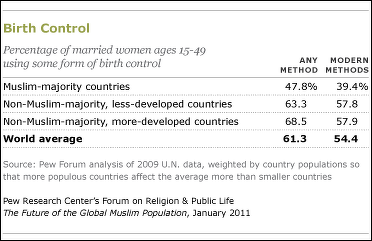
On the subject of birth control, Ali, the son-in-law of the Prophet said “the fewer the children, the more peace of mind.”
Muslims are generally more tolerant about the use of birth control than Catholics. The governments of some Muslim countries such as Pakistan, Iran, Indonesia and Egypt strongly support family planning. Iran and Malaysia have implemented strong birth-control policies that have lowered their birthrates to below-replacement levels, However, some Islamic leaders are opposed to family planning on the grounds that it is a Western plot to reduce the number of Muslim children being born.
Commenting on surrogate mothers and In vitro fertilization, scholars in Saudi Arabia "what ever is used strictly between a married couple to help them have a child is permissible, provided that no third party is involved in any way." It is acceptable for a woman to have her egg impregnated by her husbands sperm in a laboratory as long as it is replanted in her body. The use of surrogate mothers or sperm from a door other than her husband is forbidden. [Source: Arab News, Jeddah]
Some attempts at population control in the Muslim world have focusing on increasing the status of women, improving education for girls and providing women with jobs so they have an alternative to rearing children.
Some governments in Muslim countries have done little to push birth control and family planning because of Islamic traditions. Islamists have spoken out against United Nations population controls on the grounds that they condone extramarital sex, homosexuality, abortion and prostitution.
Websites and Resources: Islam IslamOnline islamonline.net ; Institute for Social Policy and Understanding ispu.org; Islam.com islam.com ; Islamic City islamicity.com ; BBC article bbc.co.uk/religion/religions/islam ; University of Southern California Compendium of Muslim Texts web.archive.org ; Encyclopædia Britannica article on Islam britannica.com ; Islam at Project Gutenberg gutenberg.org ; Muslims: PBS Frontline documentary pbs.org frontline
RECOMMENDED BOOKS:
“Birth Control & Abortion in Islam” by Muhammad Ibn Adam Al-Kawthari Amazon.com ;
“The Population Myth: Islam, Family Planning and Politics in India” by Quraishi and S. Y. Amazon.com ;
“Sex and Society in Islam: Birth Control Before the Nineteenth Century”by B. F. Musallam Amazon.com ;
“Understanding Islam and the Muslims: The Muslim Family and Islam and World Peace”
by T. J. Winter and John A. William Amazon.com ;
“The Structure Of The Muslim Family”by Sh Muhammad Amān Amazon.com ;
“Muslims of the World: Portraits and Stories of Hope, Survival, Loss, and Love” by Sajjad Shah , Iman Mahoui, et al. Amazon.com ;
“Muslim Woman's Participation in Social Life” by Abd al-Halim Abu Shuqqah and Adil Salahi Amazon.com ;
“Beyond Belief: Islamic Excursions Among the Converted People” by V.S. Naipul (1998) Amazon.com ;
“The Story of the Qur'an: Its History and Place in Muslim Life” by Ingrid Mattson Amazon.com ;
“Unveiling Islam: An Insider's Look at Muslim Life and Beliefs” by Ergun Caner and Emir Fethi Caner Amazon.com ;
“A Muslim Boy's Guide to Life's Big Changes” by Sami Khan and Abia Afsar-Siddiqui Amazon.com ;
“A Muslim Life (Following a Faith)” by Cath Senker Amazon.com ;
Contraceptives in the Muslim World
Muslim groups approve of the use of contraceptives by married couples. The prophet himself reportedly used to practice coitus interruptus, which was the one of the few methods of family planning available in the 7th century. Since sterilization is permanent there has been some debate on whether or not it should be permitted.
Coitus interruptus — the term which describes the withdrawal of the penis from the vagina before ejaculation occurs — is known to have been used in ancient times but it was condemned by Jewish, Christian, and Islamic writers who argued that the male seed was too precious to waste.
When asked in what circumstances contraceptives were allowed, the late Dr. Mahmood Abu Saud, a well-known Islamic scholar, said: “They are allowed in Islam by explicit statement of the Prophet (PBUH) where he did not forbid coitus interruptis. Shahid Athar, a well known Muslim American psychiatrist at the Islamic Center in Toledo, Ohio, said in 1992: “ Chemical contraceptives, i. e ., birth control for married women, is allowed though not promoted because of its many medical side effects. [Source: “Sexuality in Islam” by Heba G. Kotb M.D., A dissertation presented to Maimonides University, 2004]
According to the “Worldmark Encyclopedia of Religious Practices”: Muslim voices differ regarding birth control. Islam has traditionally emphasized the importance of large families that will ensure a strong Muslim community. Although family planning is not mentioned in the Qur’an, some traditions of the Prophet mention coitus interruptus. Some conservative ulama (religious scholars) object to the use of birth control because they believe it opposes God's supreme will, can weaken the Muslim community by limiting its size, and contributes to premarital sex or adultery. Today, however, the majority of ulama permit contraception that is agreed to by both the husband and the wife, since this guarantees the rights of both parties. On the other hand, sterilization is opposed by most ulama on the grounds that it permanently alters what God has created. [Source: John L. Esposito “Worldmark Encyclopedia of Religious Practices”, 2000s, Encyclopedia.com]
Islamic Scriptures That Address Contraception

Dr. Heba G. Kotb wrote: In a lot of Muslim countries, demographic matters have gained prime importance because of an unprecedented large increase in the population. No Qur’anic text forbids prevention of conception. There are, however, some Qur’anic verses which prohibit infanticide and these are used by some Muslims to discourage birth control. But contraception does not amount to killing a human being. These verses in fact were revealed to forbid the pre-Islamic Arab practice of killing or burying alive a newborn child (particularly a girl) on account of the parents' poverty or to refrain from having a female child. Perhaps in those days, people did not know safe methods of contraception and early abortion. [Source: “Sexuality in Islam” by Heba G. Kotb M.D., A dissertation presented to Maimonides University, 2004]
According to the hadiths (the sayings of Muhammad): The principle of preventing conception was accepted in those sayings of the Prophet (PBUH) which allowed some of his followers to practice 'azl or coitus interruptus. These “ahadith” (prophetic statements) embodied the earliest legal reasoning of Muslims on contraception and were essential instruments of argument in later Islamic thought on contraception. There is a sufficient number of “ahadith” on contraception. The most commonly quoted ones are the following.
1) According to Jabir, "We used to practice 'azl in the Prophet's (PBUH) lifetime while the Qur’an was being revealed." There is another version of the same hadith, "We used to practice coitus interruptus during the Prophet's (PBUH) lifetime. News of this reached him and he did not forbid us." 2) According to Jabir, "A man came to the Prophet (PBUH) and said, 'I have a slave girl, and we need her as a servant and around the palmgroves. I have sex with her, but I am afraid of her becoming pregnant.' The Prophet (pbuh) said, 'Practice 'azl with her if you so wish, for she will receive what has been predestined for her.'"
3) According to Abu Sa'id, "We rode out with the Prophet (PBUH) to raid Banu al-Mustaliq and captured some female prisoners . . . we desired women and abstinence became hard. (But) we wanted to practice 'azl; and asked the Prophet (PBUH) about it. He said, 'You do not have to hesitate, for God has predestined what is to be created until the judgment day.'" 4) According to Abu Sa'id, "The Jews say that coitus interruptus is minor infanticide, and the Prophet (PBUH) answered, 'The Jews lie, for if God wanted to create something, no one can avert it (or divert Him).'" 5) According to 'Umar Ibn Khattab, "The Prophet (PBUH) forbade the practice of 'azl with a free woman except with her permission." 6) According to Judhamah bint Wahb, "I was there when the Prophet (pbuh) was with a group saying, "I was about to prohibit the ghila (intercourse with a woman in lactation) but I observed the Byzantines and the Persians, and saw them do it, and their children were not harmed.' They asked him about coitus interruptus, and the Prophet (PBUH) replied, 'It is a hidden infanticide . . .'"
These ‘ahadith’ (Sayings) reflect two points: 1) First that the Prophet (PBUH) knew about the practice and did not prohibit it (no. 1); 2) Second, that the Prophet (pbuh) himself permitted the practice (no. 2 & 3). Muslim jurists determine the lawfulness of an act on the basis of a method, which comprises four principles or sources (usul). Two of these (Qur’an and Sunnah) are religious sources. The other two principles include analogical reasoning (qiyas) and the consensus of the 'ulama (ijma').
Al-Ghazali on Contraception
Dr. Heba G. Kotb wrote: The most detailed analysis of Islamic permission of contraception was made by the great leader of the Shafi'i School of jurism, al-Ghazali (1058-1111). He discussed this issue in his great work, Ihya' 'ulum al-Din (The revival of Religious Sciences), in the chapter on biology in religion. Al-Ghazali stated that there was no basis for prohibiting this method of contraception which is the coitus interruptus ('azl). For prohibition in Islam was possible only by adducing an original text, an explicit provision in the Qur’an or hadith) or by analogy with a given text. In the case of contraception, there was no such text, nor was there any principle on which to base prohibition. [Source: “Sexuality in Islam” by Heba G. Kotb M.D., A dissertation presented to Maimonides University, 2004]
In his view, coitus interruptus was absolutely permitted, and this permission could be ratified by analogical reasoning. A man could refrain from marriage; or marry but abstain from mating or have sexual mating but abstain from ejaculation inside the vagina (external ejaculation or coitus interruptus). Although it was better to marry, have intercourse, and have ejaculation inside the vagina, abstention from these was by no means forbidden or unlawful.
Al-Ghazali made a distinction between infanticide and contraception. He said that a child could not be formed merely by the emission of the spermatic fluid, but by the settling of semen in the woman's womb; for children were not created by the man's semen alone but of both parents together. So contraception could not be compared with infanticide which is the killing of an existing being, while contraception was different.
In the process of contraception, the two (male and female) emissions are analogous to two elements, 'offer' (ijab) and 'acceptance' (qabul, which are components of a legal contract in Islamic law. Someone who submits an offer and then withdraws it before the other party accepts it is not guilty of any violation, for a contract does not come into existence before acceptance. In the same manner, there is no real difference between the man's emission and retention of the semen unless it actually mixes with the woman's 'semen'.
Al-Ghazali classified earlier and contemporary opinions into the following groups: A) permission for 'azl; B) Permission if the wife consents but prohibition if she does not. Al-Ghazali accepts prevention or contraception if the motive for the act is any of these: 1) A desire to preserve a woman's beauty or her health, or save her life; 2) Desire to avoid financial hardship and embarrassment; 3) Avoidance of other domestic problems caused by a large family.
Turkey's Erdogan: Family Planning Not for Muslims
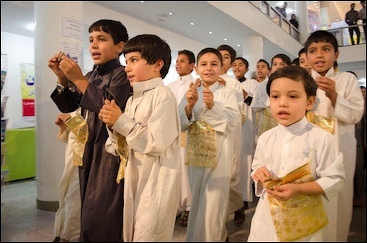
children in Ahvas, Iran participating in Gargee'an during Ramadan
In May 2016, Turkish President Recep Tayyip Erdogan said that family planning and contraception were not for Muslim families. Erdogan said it was the responsibility of mothers to ensure the continued growth of Turkey's population."I will say it clearly... We need to increase the number of our descendants," he said in a speech in Istanbul. "People talk about birth control, about family planning. No Muslim family can understand and accept that! As God and as the great prophet said, we will go this way. And in this respect the first duty belongs to mothers." [Source: Stuart Williams, AFP, May 30, 2016 ~]
AFP reported: “Erdogan and his wife Emine have two sons and two daughters. Earlier this month, the president attended the high-profile marriage of his younger daughter Sumeyye to defence industrialist Selcuk Bayraktar. The Platform to Stop Violence Against Women, which campaigns to stop the killings of hundreds of woman every year, condemned Erdogan's comments as violating the rights of women. "You (Erdogan) cannot usurp our right to contraception, nor our other rights with your declarations that come out of the Middle Ages," the group said in a statement on Twitter. "We will protect our rights," it added. ~
“Erdogan has often annoyed feminists and women's activists with his comments on sex and family planning. In a speech marking International Women's Day this year, he said he believed that "a woman is above all else a mother". In 2014, he described birth control as a "treason" which risked causing a whole generation to "dry up". And he has famously urged mothers to have four children, saying: "one (child) means loneliness, two means rivalry, three means balance and four means abundance." ~
Birth Control in Iran
In ancient Persia women inserted salt-water-soaked sponges in their vaginas in the belief it killed sperm. Today, condoms, birth control pills and intrauterine devises are widely available and free. Condoms are sold at pharmacies but government officials don’t like the word “condom” mentioned out of fear it will promote promiscuous sex among teenagers.
Faced with one of the world's highest growth rates, Iran's ruling Islamic Consultive Assembly quietly reversed it high birthrate policy in 1989 and established a family planning program. In the first three years contraceptive use jumped to 22 percent per couple.
The aggressive Iranian family program includes free vasectomies, funding for condom factories, making birth control free and available for men and women, and requiring women to take a mandatory birth control course before they are allowed to get married. Parliament tried to raised the marriage age from 9 to 15 but the effort was blocked by the Council of Guardians, a conservative religious body.
In 1997, after Mohammad Khatami was elected President of Iran, he said, “I am hoping that Iran will be able to channel 10 percent of our arms expenditures into family planning and population projects.” Conservatives were shown a religious decree that states birth control is okay. Explaining how family planning could be justified under Iran’s strict Islamic code, one mullah told Newsweek, “We favor small families because we simply couldn’t adequately educate large families. And our religion calls for an educated public.” The effort payed off. Women gave birth to an average of three children instead of six after the campaign took effect. Iran’s population growth rate was cut almost in half to 2 percent.
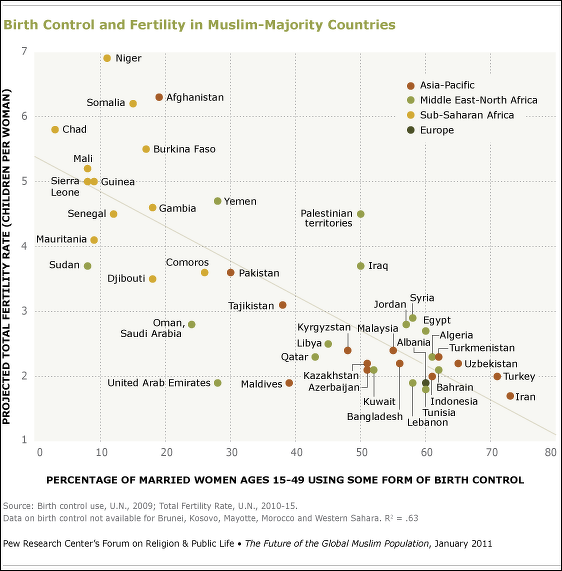
Abortion in the Islamic World
Islam is against abortion and the abortion rate is not known in many Muslim countries. Surveys among Muslims show that they are more than twice as likely to disapprove of abortion than people in Western countries. The famous Egyptian scholar Yusuf Al Qaradawi wrote that abortion is "a crime—because it constitutes an offence against a complete live human being." He also has a said that pregnancy that endangers the life of a mother can be terminated with an abortion because a principal of Sharia (Islamic law) allows the choosing of the lesser of two evils.
According to the BBC: “Muslims regard abortion as wrong and haram (forbidden), but many accept that it may be permitted in certain cases. All schools of Muslim law accept that abortion is permitted if continuing the pregnancy would put the mother's life in real danger. This is the only reason accepted for abortion after 120 days of the pregnancy. Different schools of Muslim law hold different views on whether any other reasons for abortion are permitted, and at what stage of pregnancy if so. Some schools of Muslim law permit abortion in the first 16 weeks of pregnancy, while others only permit it in the first 7 weeks. However, even those scholars who would permit early abortion in certain cases still regard abortion as wrong, but do not regard it as a punishable wrong. The more advanced the pregnancy, the greater the wrong. The Qur'an does not explicitly refer to abortion but offers guidance on related matters. Scholars accept that this guidance can properly be applied to abortion. |[Source: BBC, September 7, 2009
John L. Esposito wrote in the “Worldmark Encyclopedia of Religious Practices”: In Islam procreation is considered an important result of marriage, and for this reason many Muslims oppose abortion. According to Muslim religious scholars, abortion after the fetus obtains a soul (views differ on whether this occurs at fertilization or after 120 days) is considered homicide. The Qur’an emphasizes the preservation of life (17:31), with neither poverty nor hunger justifying the killing of offspring, and stresses that punishment for unlawfully killing a human being is to be imposed both in this life and in the afterlife (4:93). Therapeutic abortions, performed as a result of severe medical problems, are justified by a general principle of Islamic law that chooses the lesser of two evils. Instead of losing two lives, the life of the mother, who has important duties and responsibilities, is given preference. [Source: John L. Esposito “Worldmark Encyclopedia of Religious Practices”, 2000s, Encyclopedia.com]
Muslim Views on Abortion
The Muslim prohibition of abortion is based on the passages from the Qur’an such as: "Kill not your child on a plea of want...We provide sustenance for you and for them...Take not life which Allah hath made sacred except by way of justice and law."
According to the BBC: “The Islamic view is based on the very high priority the faith gives to the sanctity of life. The Qur'an states: “Whosoever has spared the life of a soul, it is as though he has spared the life of all people. Whosoever has killed a soul, it is as though he has murdered all of mankind.” (Qur'an 5:32) Most Muslim scholars would say that a foetus in the womb is recognised and protected by Islam as a human life. [Source: BBC, September 7, 2009 |::|]
“The Qur'an makes it clear that a foetus must not be aborted because the family fear that they will not be able to provide for it - they should trust Allah to look after things: “Kill not your offspring for fear of poverty; it is We who provide for them and for you. Surely, killing them is a great sin.” — Qur'an 17:32 The same (and similar) texts also ban abortion on social or financial grounds relating to the mother or the rest of the family - e.g. that the pregnancy wasn't planned and a baby will interfere with the mother's life, education or career.
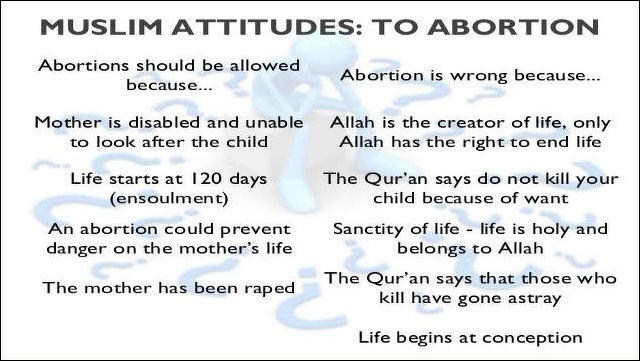
When asked what choices an unmarried and pregnant Muslim girl had, Dr. Abu Saud said: “The first option is to marry the father of the child. The second is to have an abortion in the first three months of pregnancy. The third is to keep the child, and the fourth is to give him/her up for adoption providing the child keeps his father's name. [Source: “Sexuality in Islam” by Heba G. Kotb M.D., A dissertation presented to Maimonides University, 2004]
Shahid Athar said in 1992: “Abortion if the health of the mother is physically or mentally threatened; otherwise, carry to term, then adoption or even marriage with the boy if possible. Hopefully, Muslim girls don't come to this difficult stage and marry beforehand. If they are ready for sex, they should be ready for marriage.
When asked is abortion allowed if the life of the woman is in danger or if tests show the fetus is handicapped of has Down's syndrome, Abu Saud said: “If there were danger for the mother, abortion would be allowed. If there will definitely be a congenital defect, then the matter depends on the degree of this defect. If it is so serious that the child will not be able to function at all, or will not be able to live on his own, then the question is controversial. In all cases, if abortion takes place in the first three months (that is, four months from the last period), it may be carried out. Shahid Athar said “Yes, under medical decision. Abortions are not allowed unless it is a matter of rape and incest, and the health of the mother is concerned.
When asked if he thought abortion was murder, Abu Saud said: “Most of the Muslim jurists do not think that abortion before the end of the third month is murder, although they declare it reprehensible unless there is a legitimate justification. If it is illegal, then it is the woman's problem; she should have taken enough precaution not to get pregnant.
Muslim Views on Abortion and The Soul
According to the Qur’an a fetus passes through three stages before birth—“ nutfah” , “ alaqah” and “ mugdah” —each lasting 40 to 42 days. Muslims generally believe that a soul enters a fetus on the 120th day of pregnancy and then the aforementioned stages begin.
According to the BBC: “Islam forbids the termination of a pregnancy after soul or 'Ruh' is given to the foetus. There's disagreement within Islam as to when this happens. The three main opinions are: 1) at 120 days; 2) at 40 days; and 3) when there is voluntary movement of the foetus. The later usually happens during the 12th week of gestation but many women don't notice the movement until much later - sometimes as late as 20 weeks. “However, it's important to note that many scholars believe that life begins at conception, and that all scholars believe that an embryo deserves respect and protection at all stages of the pregnancy. [Source: BBC, September 7, 2009 |::|]
A hadith that suggests that the the soul enters the foetus at 120 days by Abdullah reads: “Allah's Apostle, the true and truly inspired said, "(as regards your creation), every one of you is collected in the womb of his mother for the first forty days, and then he becomes a clot for another forty days, and then a piece of flesh for another forty days. Then Allah sends an angel to write four words: He writes his deeds, time of his death, means of his livelihood, and whether he will be wretched or blessed (in religion). Then the soul is breathed into his body..." [Source: Sahih Bukhari, Volume 4, Book 55, Number 549 |::|]
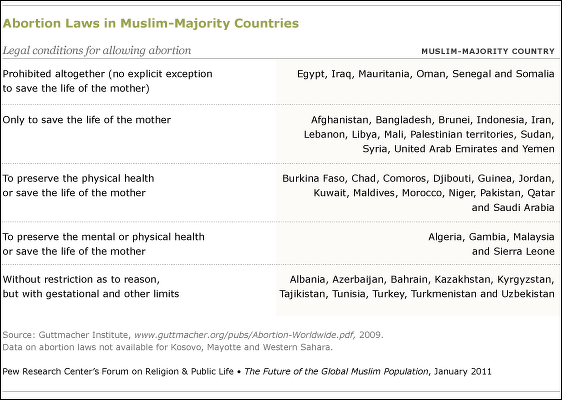
Justifications for Abortion in the Muslim World
According to the BBC: “Islam allows abortion to save the life of the mother because it sees this as the 'lesser of two evils' and there is a general principle in Sharia (Muslim law) of choosing the lesser of two evils. Abortion is regarded as a lesser evil in this case because: 1) the mother is the 'originator' of the foetus; 2) the mother's life is well-established; 3) the mother has with duties and responsibilities; 4) the mother is part of a family; 5) allowing the mother to die would also kill the foetus in most cases |::|
“If it is confirmed in the early period of pregnancy that a foetus suffers from a defect that can't be treated and that will cause great suffering to the child, a number of scholars would say that it is permissible to abort, provided that the pregnancy is less than 120 days old. A slightly more liberal opinion is that abortion within the first 120 days would be permitted if a child would be born with such physical and mental deformity as would deprive the child of a normal life. The opinion of at least two competent medical specialists is required. |::|
“Other scholars disagree and hold that abortion is not permitted in such cases. There is almost unanimous opinion that after 120 days an abortion is not permissible unless the defect in the embryo puts the mother's life in danger. |::|
“In recent times in Iran, Ayatollah Ali Khameni has issued a fatwa permitting abortion for foetuses under 10 weeks shown to have the genetic blood disorder thalassemia. And also in Iran, Grand Ayatollah Yusuf Saanei issued a fatwa which permits abortion in the first three months for various reasons. Saanei accepted that abortion was generally forbidden in Islam, but went on to say: But Islam is also a religion of compassion, and if there are serious problems, God sometimes doesn't require his creatures to practice his law. So under some conditions — such as parents' poverty or overpopulation — then abortion is allowed. [Source: Los Angeles Times, December 29, 2000]

pro-life banner
“Widely quoted is a resolution of the Islamic jurisprudence council of Mekkah Al Mukaramah (the Islamic World League) passing a Fatwa in its 12th session held in February 1990. This allowed abortion if the foetus was: “grossly malformed with untreatable severe condition proved by medical investigations and decided upon by a committee formed by competent trustworthy physicians, and provided that abortion is requested by the parents and the foetus is less than 120 days computed from moment of conception.” Attributed, Mekkah Al Mukaramah, February 1990 |::|
Muslim View on Abortion Rape, Incest and Adultery
According to the BBC: “Some scholars state that abortion where the mother is the victim of a rape or of incest is permissible in the first 120 days of the pregnancy. Others say abortion for such reasons is never permitted. Explaining the difficulty of such a case, the scholar Sheikh M. A. Al-Salami told the BBC: “I believe that the value of life is the same whether this embryo is the result of fornication with relatives or non-relatives or valid marriage. In Sharia life has the same value in all cases.” [Source: BBC, September 7, 2009 |::|]
“It is reported that Bosnian women raped by the Serbian army were issued a fatwa allowing them to abort, but were urged to complete the abortion before the 120 day mark. A similar fatwa was issued in Algeria. This demonstrates that Islamic law has the flexibility to be compassionate in appropriate circumstances. |::|
“In Egypt (where abortion is illegal) in June 2004, Muhammad Sayed Tantawi, the Grand Sheikh of Al Azhar, approved a draft law allowing women to abort a pregnancy that is the result of rape. The law would also make it legal for women to undergo an abortion more than four months after conception. |::|
“His decision caused controversy among other Muslim scholars: The mufti of Egypt, Ali Gomaa, said Tantawi's decision was wrong and violated the Qur'an's injunction that "forbids killing innocent souls." He said, "It is haram [forbidden] to abort the fetus after life is breathed into it, in other words after 120 days." However, he added that a woman could terminate a pregnancy if she was in immediate danger. |::|
“Islam does not permit abortion where an unwanted pregnancy is the result of unforced adultery.
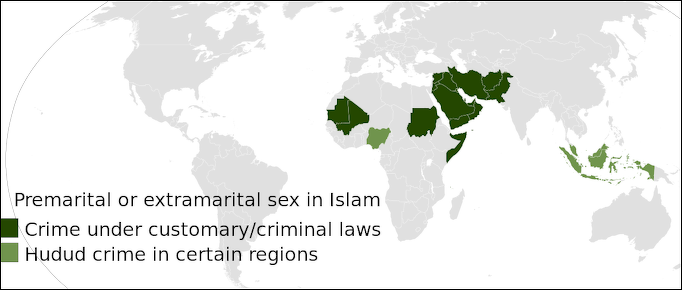
countries with zina laws (criminalization of premarital and extramarital sex under sharia in Islam)
Female Infanticide in Pre-Islamic Times
According to “Human Sexuality: An Encyclopedia”: In pre-Islamic times, though women were active in business and trade, female infanticide was widely practiced. Modern commentators have held that infanticide was done for economic reasons—for example, because girls were not as productive as boys and too many daughters would lead to the loss of a family's fortune through marriage. Others have argued that it was to prevent tainting the family's name and honor. Still, some think the practice was based on a primitive belief that women were the embodiment of the devil and therefore should be buried alive. It was Islam that put an end to this abhorrent behavior among the Arabs. [Source:“Human Sexuality: An Encyclopedia”, Haeberle, Erwin J., Bullough, Vern L. and Bonnie Bullough, eds., sexarchive.info]
Muslims were sternly warned that they would be held accountable on the Day of Judgment for any acts of infanticide. In general, Islam prohibits killing or aborting children of any sex because of poverty or fear of lowering the family's standard of living. It is God who provides for parents as well as children. He is the Creator, Cherisher, and Provider. For this reason, Islam even encourages a good Muslim to marry the poor, for God will enrich the person who does so.
Image Sources: Wikimedia Commons, Pew Forums
Text Sources: Pew Research Center, Arab News, Jeddah; “Islam, a Short History” by Karen Armstrong; “A History of the Arab Peoples” by Albert Hourani (Faber and Faber, 1991); “World Religions” edited by Geoffrey Parrinder (Facts on File Publications, New York); “Encyclopedia of the World’s Religions” edited by R.C. Zaehner (Barnes & Noble Books, 1959); Metropolitan Museum of Art, Encyclopedia.com, National Geographic, BBC, New York Times, Washington Post, Los Angeles Times, Smithsonian magazine, The Guardian, Al Jazeera, The New Yorker, Time, Newsweek, Reuters, Associated Press, AFP, Library of Congress and various books and other publications.
Last updated April 2024
